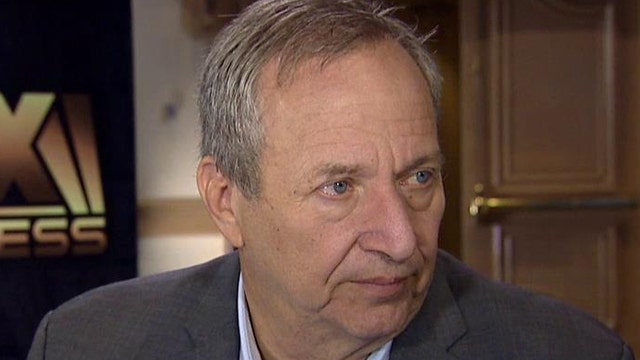Summers at SALT: Need Mix of Public, Private Investment
Former Treasury Secretary and presidential economic advisor Larry Summers said a mix of public and private investment in U.S. infrastructure would be a good start toward easing the U.S. economy out of its malaise.
“In the United States, infrastructure is a public issue and it is a private issue,” Summers said in an interview Thursday with FOX Business Network’s Maria Bartiromo at the SALT conference in Las Vegas. “As a public issue, it is crazy that at a time of unprecedentedly low-interest rates, unprecedentedly high rates of non-employment for men who work with their hands, that we are doing less public investment than at any time since the Second World War relative to the economy.”
Summers ticked off a laundry list of industries and sectors that could be improved through a mix of public and private investment.
“It is crazy that we are not, after adjusting for depreciation, growing our public capital stock at all. It is odd, Maria, in the extreme that we have an air traffic control system that's based on vacuum tubes here in 2015,” Summers said.
“At the same time, there is a lot we could do that would promote private infrastructure investment as well. Carrying oil on trains is a 20th century technology, and not the last half of the 20th century. We need an adequate pipeline infrastructure,” he added. “We should not have much inferior cellphone service to many other countries. We should not have inadequate broadband.”
It’s a bi-partisan issue, according to Summers.
“This is not something where either party has the complete truth,” Summers noted. “Yes, we need more public investment but we also need to make sure we are attentive to private -- to barriers that are holding back private investment in infrastructure. We need both if we are going to move this economy and if we get growth we will find many other problems, like the debt and deficits will have a tendency to melt away.”
Summers added, “If we don't, even with a lot of pain and austerity, those problems are going to get worse. So the focus has to be really crucially on growth, in my judgment.”
Asked why there hasn’t been more energy pipeline development in the U.S., Summers responded: “It is a combination of things. We have a regulatory framework in which the right to veto is promiscuously distributed. And when you have so many who are able to veto a pipeline, it is very hard to get it started.”
Summers added that “misguided concern about fossil fuels has delayed pipeline infrastructure. I am as concerned or more concerned about global climate change as an ultimate issue, but we do not advance the fight against global climate change by dangerously transporting oil on trains. And so I think that a more proper focus on pipelines would be appropriate.”




















